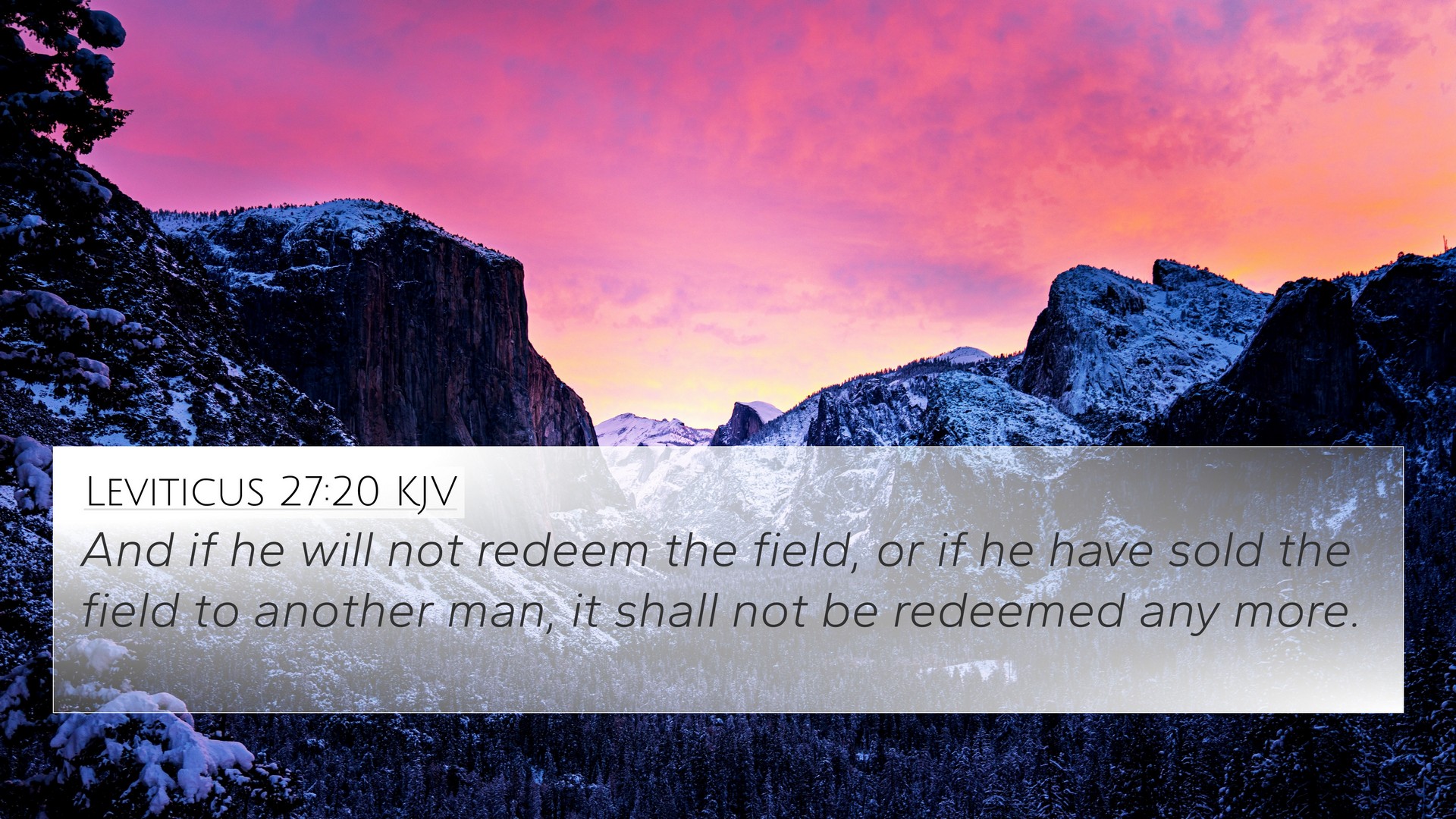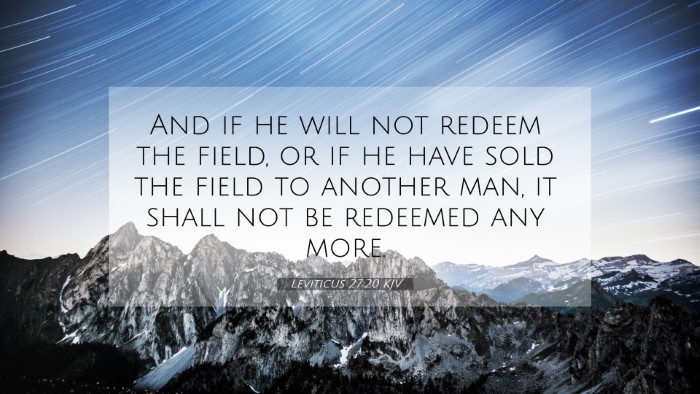Understanding Leviticus 27:20
Verse: Leviticus 27:20 states: "And if he will not redeem the field, or if he have sold the field to another man, it shall not be redeemed any more." This verse deals with the laws concerning the dedication of property to the Lord and the implications of its sale.
Summary of Insights
This verse highlights the importance of ownership and the inability to reclaim property once it has been sold, emphasizing the seriousness of vows and commitments made before God. Below we explore various public domain commentaries to deepen our understanding.
Commentary Insights
-
Matthew Henry:
Matthew Henry notes that this passage reinforces the sanctity of vowed property. If a person dedicated a field to the Lord but later chooses to sell it, the commitment cannot be reversed. This illustrates the principle that once something is dedicated to God, it holds a sacred status that must be honored. The implication is that promises made should be treated with the utmost seriousness.
-
Albert Barnes:
Barnes adds that this law serves to protect both the sanctity of the land and the community's welfare. By selling the land that was dedicated, one not only breaks a personal commitment but also risks the stability and allotted distribution of heritage among tribes. The stewardship over God’s gifts requires fidelity to vows.
-
Adam Clarke:
Clarke emphasizes the consequences of violating one's vow to God. The inability to redeem the field reflects the divine ownership over created things, demonstrating how human actions require alignment with spiritual responsibilities. Clarke also mentions the broader implications for communal integrity among the Israelites.
Related Bible Cross References
Here are some pertinent connections with other scripture passages that can be found when analyzing Leviticus 27:20:
- Numbers 30:2 - Discusses the importance of fulfilling vows made to God.
- Deuteronomy 23:21 - Encourages the fulfillment of vows to the Lord.
- 1 Samuel 1:11 - Hannah's vow reflects the personal dedication to God.
- Ecclesiastes 5:4-5 - Warns against making hasty vows to God.
- Matthew 5:33-37 - Jesus emphasizes the importance of truthfulness regarding oaths and promises.
- James 5:12 - Advises on the integrity of one’s word to avoid condemnation.
- Luke 14:28 - Encourages careful consideration before making commitments, illustrating the need for forethought about personal vows.
- Zachariah 5:1-4 - Talks about the implications of truth and the consequences of dishonesty.
- Romans 12:1 - Suggests that presenting ourselves as living sacrifices is akin to dedicating our belongings to God.
- 1 Corinthians 6:19-20 - Affirms the ownership of God over what we dedicate, including ourselves and what belongs to us.
Connections Between Bible Verses
Leviticus 27:20 connects significantly with themes of dedication and vows across the Bible. By understanding these connections, believers can better appreciate the continuity of God’s expectations from the Old Testament to the New Testament. An examination of these inter-Biblical dialogues reveals a consistent emphasis on integrity and commitment, seen prominently in both the law and Christ’s teachings.
Thematic Bible Verse Connections
- Accountability: Every vow or designation carries weight, and Leviticus 27:20 serves as a reminder of the community's expectation of accountability to God.
- Divine Ownership: The theme of God's ownership over all creation is further reflected in other scriptures where God claims His authority over our choices and belongings.
- Community Ethics: Ethical standards that were expected of the Israelites are still relevant today, guiding how we manage our commitments.
Conclusion
In summary, Leviticus 27:20 serves as a crucial reminder regarding the seriousness of vows and dedication in the context of Biblical faith. By investigating its implications alongside related scripture, believers can deepen their understanding of biblical principles concerning commitment, ownership, and community ethics. This careful analysis prompts us to reflect on how we approach our promises to God in contemporary practice.
Tools for Bible Cross-Referencing
Incorporating tools for Bible cross-referencing can enhance one’s understanding of scripture immensely:
- Bible Concordance: A valuable tool for finding references, topics, and keywords across the Bible.
- Bible Cross-Reference Guide: Helps navigate interconnections and thematic studies efficiently.
- Cross-Reference Bible Study: Methods for exploring scripture parallels for deeper insights.
- Bible Reference Resources: Various materials and tools available for comprehensive cross-referencing.


